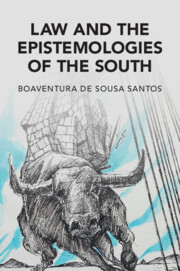Book contents
- Law and the Epistemologies of the South
- CAMBRIDGE STUDIES IN LAW AND SOCIETY
- Law and the Epistemologies of the South
- Copyright page
- Contents
- Preface
- Abbreviations
- Part One The Tragic Optimism of the Law: THE END OF A STORY
- Part Two Epistemologies of the South and the Law
- Part Three The Abyssal Law under the Mode of Abyssal Exclusion
- Part Four Real Legal Utopias: Interrupting the State
- Part Five Real Legal Utopias: Interrupting the Law
- Part Six Real Legal Utopias: Interrupting Hegemonic Human Rights
- Nineteen Human Rights in a Post-Secular Age: Counter-Hegemony and Progressive Theologies
- Twenty Towards an Insurgent, Intercultural, and Cosmopolitan Declaration of Human Rights and Duties
- Twenty-One Rights of Nature
- Conclusion
- References
- Index
- Cambridge Studies in Law and Society
Nineteen - Human Rights in a Post-Secular Age: Counter-Hegemony and Progressive Theologies
from Part Six - Real Legal Utopias: Interrupting Hegemonic Human Rights
Published online by Cambridge University Press: 07 August 2023
- Law and the Epistemologies of the South
- CAMBRIDGE STUDIES IN LAW AND SOCIETY
- Law and the Epistemologies of the South
- Copyright page
- Contents
- Preface
- Abbreviations
- Part One The Tragic Optimism of the Law: THE END OF A STORY
- Part Two Epistemologies of the South and the Law
- Part Three The Abyssal Law under the Mode of Abyssal Exclusion
- Part Four Real Legal Utopias: Interrupting the State
- Part Five Real Legal Utopias: Interrupting the Law
- Part Six Real Legal Utopias: Interrupting Hegemonic Human Rights
- Nineteen Human Rights in a Post-Secular Age: Counter-Hegemony and Progressive Theologies
- Twenty Towards an Insurgent, Intercultural, and Cosmopolitan Declaration of Human Rights and Duties
- Twenty-One Rights of Nature
- Conclusion
- References
- Index
- Cambridge Studies in Law and Society
Summary
This chapter opens the final section of the book in which I identify some promising real legal utopias emerging from social activism against unjust suffering caused by capitalism, colonialism, and patriarchy, with a special focus on the pandemic and the ecological crises. In this chapter, I focus on the possibility deriving from a spiritual understanding of the dignity of human and other living beings as a source of nonconformism, resistance and struggle in the direst conditions of human suffering. Such an encounter between spirituality and unjust suffering has been at the core of progressive theologies. I propose an ecology of knowledges and practices involving secular knowledges (human rights) and spiritual or religious knowledges (progressive theologies). Progressive theologies have been in the front line of struggles against the radical separation between humanity and subhumanity. The struggle against unjust human suffering is conceived herein as a starting point for a counter-hegemonic reinvention of human rights. In light of the reactionary challenge to human rights, the progressive challenge faces a double task: to question the hegemonic conception of human rights, and to do so in a such a way as to give credibility to a stronger intercultural, anti-capitalist, anti-colonialist, anti-patriarchal and, in sum, counter-hegemonic conception of human rights. I begin with a radical critique of the conventional understanding of human rights and then present one of the possible paths towards a counter-hegemonic conception of human rights: the meeting point between human rights repertoires and progressive political theologies.
Keywords
- Type
- Chapter
- Information
- Law and the Epistemologies of the South , pp. 561 - 597Publisher: Cambridge University PressPrint publication year: 2023



